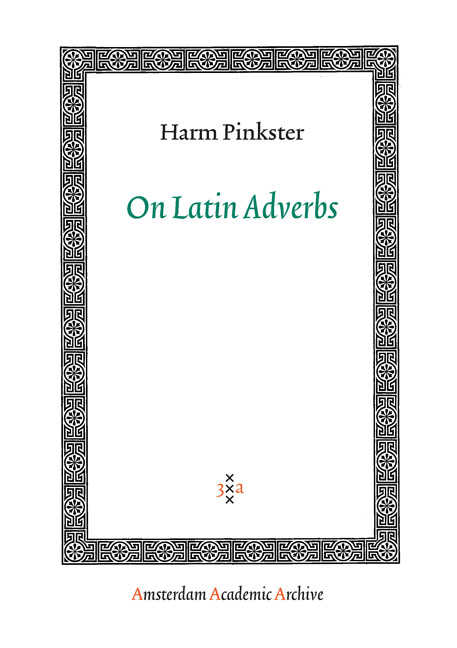Book contents
- Frontmatter
- Preface to this Edition
- Preface
- Contents
- Introduction
- 1 General Problems of Studying a Dead Language
- 2 Problems of Classification
- 3 Adverbs in Roman Grammatical Theory
- 4 The Adverb in Latin Linguistics
- 5 Adverbs as Derived Forms
- 6 Syntactic Problems
- 7 Subclassification of Adverbs
- 8 Adverbs and other Invariables
- 9 The Relationship Between Adverbs and Prepositions
- 10 Adverbs and Connectors
- 11 Adverbs and Subordinators
- Bibliography
- Indices
- Index Auctorum
- Titles Published in the Aaa Series
7 - Subclassification of Adverbs
Published online by Cambridge University Press: 24 January 2021
- Frontmatter
- Preface to this Edition
- Preface
- Contents
- Introduction
- 1 General Problems of Studying a Dead Language
- 2 Problems of Classification
- 3 Adverbs in Roman Grammatical Theory
- 4 The Adverb in Latin Linguistics
- 5 Adverbs as Derived Forms
- 6 Syntactic Problems
- 7 Subclassification of Adverbs
- 8 Adverbs and other Invariables
- 9 The Relationship Between Adverbs and Prepositions
- 10 Adverbs and Connectors
- 11 Adverbs and Subordinators
- Bibliography
- Indices
- Index Auctorum
- Titles Published in the Aaa Series
Summary
In the preceding chapter I endeavoured to show that generally speaking the relationship of adverbs towards other constituents (both in the phrase and, also, .particularly, in the clause or sentence) is much more complicated than the notion ‘modify’ in the traditional definition would suggest. In this chapter I will discuss three criteria by which adverbs can be classified in a dead language even in. those cases where there are no differences with respect to the constituents the adverbs are combined with. For example, in 4.2. a semantic distinction was observed between e.g. vehementer dicere ('to speak impetuously’) and vehementer displicere ('to displease strongly’), manner adverb and intensifier respectively from the semantic point of view. The question was mentioned of whether there are syntactic differences corresponding with the semantic ones. This chapter will be devoted to questions like this. The three criteria discussed are (1) the use of question words; (2) word order; (3) coordination. Coordination will be shown to be most useful.
The use ofquestion words
In the following examples we find several adverbs constructed with adjectives. These adverb-adjective combinations are constructed with a noun. This can be expressed as follows: Noun ((Adverb) Adjective)(cf. 4.2. - the adverbs are italicized)
(1) (a) laudo hominem valde nobilem
('.I praise the very famous man’).
(b) laudo hominem vehementer nobilem
('… the very famous …’).
(c) laudo hominem sapienter nobilem
(lit.’ … the wisely famous …'; cf. (11)-(13) in 4.2.).
(d) laudo hominemfortasse nobilem
('I praise the perhaps famous man'; cf. (18) in 4.3.2.).
(e) laudo hominem illic nobilem
('… famous there …'; cf. (26) in 4.3.3.).
(f) laudo hominem haud dubie nobilem
(’ … undoubtedly famous …'; cf. (52) in 6.3.).
Intuitively, these adverbs seem to belong to different subclasses though they share the characteristic of being optional with respect to an adjective as their HEAD.
These differences could be brought to light by examining which questions (or question types) these sentences might occur as answer to. Such questions might be
(1) (a’) quam nobilis est homo quem laudas? “ :: valde nobilis est ('how famous is the man you praise? :: very famous’): intensifier.
(b’) quam nobilis …? :: vehementer nobilis est ('how famous …? :: very famous’): intensifier.
(c’) ? quomodo nobilis …? :: sapienter nobilis est ('in what way is the man famous? :: wisely’) : manner.
Information
- Type
- Chapter
- Information
- On Latin Adverbs , pp. 103 - 134Publisher: Amsterdam University PressPrint publication year: 2005
